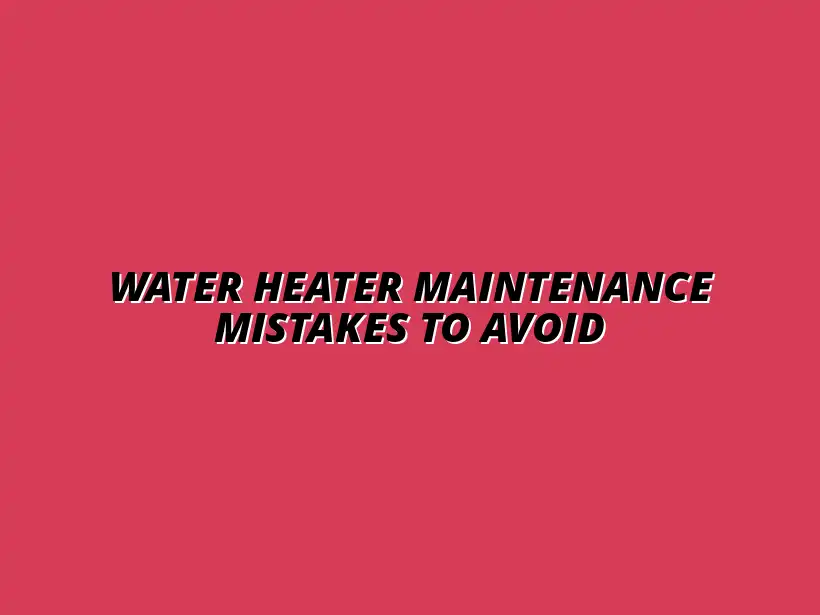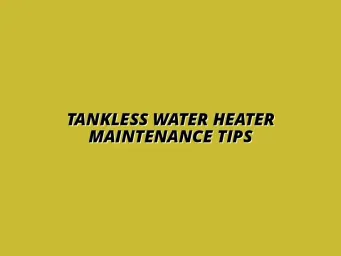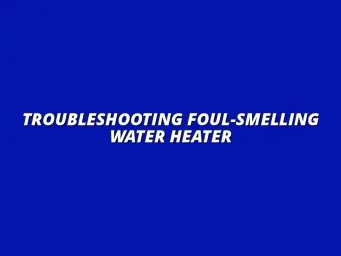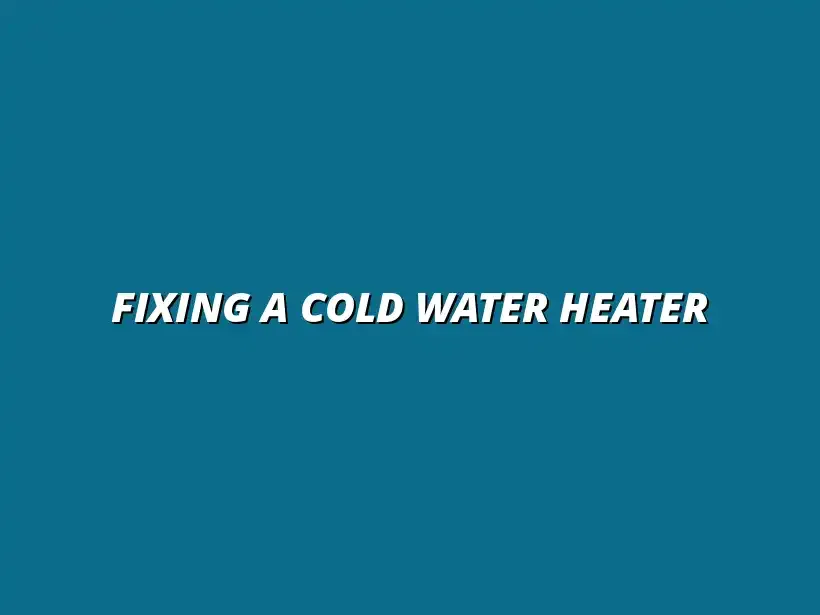
Water Heater Maintenance Mistakes to Avoid
Understanding the Importance of Water Heater Maintenance
Regular maintenance of your water heater is crucial for ensuring it operates effectively and efficiently. By taking care of your unit, you can extend its lifespan and maintain optimal performance. This not only keeps your water heating system running smoothly but also saves you from unexpected repairs and replacements down the road.
Water heater maintenance typically involves routine checks, cleaning, and timely repairs. These actions prevent the buildup of sediment, reduce the risk of leaks, and enhance energy efficiency. In short, keeping your water heater well-maintained results in a more reliable and cost-effective system!
Defining Water Heater Maintenance and Its Benefits
Water heater maintenance refers to the routine practices aimed at ensuring your system remains in top shape. These practices can vary from cleaning the unit to checking for leaks and adjusting temperature settings. By investing time in maintenance, you can enjoy several benefits that can greatly impact your home comfort and finances.
- Increased Efficiency: Regular maintenance helps your water heater operate more efficiently, saving on energy costs.
- Longer Lifespan: A well-maintained water heater can last significantly longer than one that is neglected.
- Prevention of Major Repairs: Addressing minor issues early can prevent costly repairs in the future.
Why Regular Maintenance Is Essential for Longevity
Just like any household appliance, water heaters require regular care to function properly over time. When you perform maintenance checks, you allow yourself the chance to spot issues before they escalate. This proactive approach not only saves money but also ensures that your heater is always ready to provide hot water when you need it!
Moreover, regular maintenance can substantially extend the life of your water heater. A well-cared-for unit can often last over a decade, while neglect can shorten this lifespan dramatically. By committing to a maintenance routine, you're investing in the long-term reliability of your water heating system. For more tips on maintaining your water heater efficiently, check out this helpful guide.
Cost Savings Beyond the Initial Investment
Many homeowners focus on the initial cost of purchasing a water heater and overlook the importance of maintenance costs. However, regular maintenance can lead to significant savings in the long run. This includes avoiding the expense of premature replacements and reducing energy bills thanks to improved efficiency.
Additionally, well-maintained water heaters are less likely to experience breakdowns, which can be frustrating and expensive. By keeping up with maintenance, you ensure that your investment continues to yield value, providing reliable hot water without unexpected costs!
Common Water Heater Maintenance Mistakes
Even with the best intentions, many homeowners overlook critical aspects of water heater maintenance. Understanding these common mistakes can help you avoid pitfalls that may lead to inefficiencies or even damage. By being aware of these mistakes, you can take proactive steps to ensure your water heater remains in optimal condition.
Some of the most frequent maintenance errors include skipping inspections, ignoring leaks, and not properly setting the temperature. Let's delve deeper into these issues to understand their implications.
Neglecting Regular Inspections and Maintenance
One of the most significant mistakes homeowners make is neglecting to schedule regular inspections for their water heaters. Many people think that, as long as the heater is functioning, there’s no need for a check-up. However, this can be a dangerous assumption.
- Potential Risks: Skipping routine checks can lead to unnoticed leaks or other issues that can escalate over time.
- Reduced Efficiency: A lack of maintenance can cause your system to work harder, leading to increased energy costs.
- Shortened Lifespan: Just like any other appliance, without regular care, your water heater may not last as long as it should.
Identifying the Risks of Skipping Routine Checks
Failing to conduct routine checks on your water heater can have serious consequences. One of the most pressing risks is the formation of sediment buildup, which can lead to overheating and potential tank failure. Regular annual water heater inspections are highly recommended to avoid this. Additionally, skipping inspections can allow minor issues such as leaks to go unnoticed, which may eventually lead to extensive water damage in your home!
Regular inspections help catch these problems early. It's advisable to have your system checked at least once a year, ensuring everything is functioning as it should. By prioritizing maintenance, you can avoid the headaches associated with significant repairs!
How Often Should You Schedule Professional Inspections?
Experts recommend scheduling professional inspections at least once a year. This allows a technician to thoroughly assess your water heater, checking for any potential issues. Depending on usage, some homeowners may benefit from even more frequent inspections.
In addition to annual checks, it's wise to keep an eye on your unit and address any unusual noises or performance issues as they arise. By staying proactive, you can maintain your heater's efficiency and longevity!
Ignoring Water Heater Leaks and Corrosion
Ignoring leaks and signs of corrosion can lead to major issues down the line. Water heaters are not immune to wear and tear, and if left unchecked, these problems can escalate rapidly. Recognizing the signs of leaks and addressing them promptly is essential for protecting your home. Learning how to flush your water heater easily can help prevent some of these issues.
- Common Signs of Leaks: Puddles around the base of the heater, damp spots on walls, or rusting around the fittings.
- Corrosion Indicators: Brown or rusty water and unusual noises from the tank.
Signs of Leaks and Corrosion to Watch For
Be vigilant for any signs that may indicate your water heater is leaking. Look for water pooling around the base or dampness on adjacent walls. Not only can leaks lead to costly water damage, but they can also compromise the unit's integrity!
Corrosion can be trickier to spot, yet it’s equally important. If you notice rusty water or corrosion around the tank fittings, it's a clear signal that maintenance is urgently needed. Addressing these signs promptly can save you from more significant problems later on!
Long-Term Consequences of Ignoring These Issues
Failing to address leaks and corrosion can have dire consequences for your water heater. Long-term neglect may lead to complete tank failure, resulting in leaks that can damage your home and property. Additionally, continuing to use a corroded water heater can pose safety hazards, including the risk of hot water burns!
Thus, it’s important to act quickly if you identify leaks or corrosion. Regular inspections can help detect these issues early, allowing for timely repairs. Remember, a stitch in time saves nine!
Improper Temperature Settings
Another common mistake is setting your water heater temperature incorrectly. Many people may not realize that improper settings can lead to safety hazards and inefficiencies. It's crucial to find the right balance for your household needs without compromising safety!
- Recommended Temperature: The U.S. Department of Energy recommends a temperature setting of 120°F.
- Benefits of Proper Setting: This temperature is safe enough to prevent scalding while also maximizing energy efficiency.
Recommended Temperature Settings for Safety and Efficiency
For safety and efficiency, it’s best to keep your water heater set at 120°F. This temperature is warm enough for most tasks, like showering and washing dishes, while reducing the risk of scalding. It also helps to lower energy costs and extend the life of your heating element.
By adjusting the temperature, you not only ensure safety but also optimize the performance of your water heater. It’s a simple fix that can have lasting benefits!
How Temperature Affects Energy Consumption
The temperature setting of your water heater significantly impacts your energy consumption. Higher temperatures mean more energy is needed to maintain that level, leading to inflated energy bills. Conversely, a well-adjusted temperature can help keep your energy costs in check while ensuring hot water availability!
By being mindful of your temperature settings, you can improve efficiency and save money. It's one of those easy maintenance tasks that's often overlooked but can yield great results!
Overlooking the Importance of Flushing the Tank
Many homeowners forget about the necessity of flushing their water heater tank regularly. Over time, sediment can accumulate at the bottom, leading to decreased efficiency and potential damage. Flushing is a straightforward task that should not be ignored!
- Benefits of Flushing: Helps remove sediment buildup, prevents overheating, and enhances efficiency.
- How Often to Flush: It’s generally recommended to flush your tank at least once a year.
Why Regular Flushing Is Necessary
Flushing your water heater is essential to remove accumulated sediment and minerals. If left unchecked, these deposits can harden and cause overheating, damaging your heater over time. Regular flushing ensures that your heater runs efficiently and can extend its operational life!
Not to mention, regular maintenance through flushing can help keep your water clean and clear. It’s a relatively easy step that can provide significant benefits! For a step-by-step guide, see our article on how to flush your water heater easily.
Steps to Properly Flush Your Water Heater
Flushing your water heater is a simple process that you can do yourself. Here are the steps to follow:
- Turn off the heater and allow it to cool down.
- Close the cold water supply valve.
- Connect a garden hose to the drain valve and position it to drain safely.
- Open the drain valve and let the water run until it clears.
- Close the drain valve, remove the hose, and turn the cold water supply back on.
Following these steps regularly can keep your water heater in great shape. It’s a quick task that can lead to long-term benefits!
Failure to Replace Anode Rods
The anode rod is a crucial component of your water heater, designed to prevent corrosion. Unfortunately, many homeowners don’t realize its importance and neglect to check or replace it. Regularly monitoring the anode rod can help protect your water heater from damage!
- What Are Anode Rods? They attract corrosive elements in the water, helping to prolong the life of your heater.
- Replacement Frequency: Anode rods typically need replacement every 3-5 years, depending on water quality.
Understanding the Role of Anode Rods in Water Heaters
The anode rod plays a vital role in protecting your water heater from corrosion. When the rod begins to deteriorate, the water heater’s tank becomes more susceptible to rust and decay. Therefore, it’s essential to inspect and replace the anode rod as needed to ensure the longevity of your unit!
Ignoring this component can lead to extensive damage, requiring costly repairs or even a replacement heater. Prioritizing the anode rod’s maintenance is a small yet crucial step in water heater care!
Signs That It’s Time for a Replacement
There are several signs that indicate it’s time to replace your anode rod:
- Visible corrosion or deterioration of the rod itself.
- Rusty water coming from your taps.
- Increased sediment buildup in the tank.
If you notice any of these indicators, it’s best to replace the rod promptly. Keeping this small part in check can save you from significant water heater issues!
Assuming All Water Heaters Are the Same
Another common mistake is assuming all water heaters have the same maintenance needs. There are various types and models, each with different requirements and specifications. It’s essential to understand the unique needs of your water heater to ensure proper care!
- Types of Water Heaters: Tankless, traditional tank, and heat pump water heaters.
- Maintenance Needs: Each type may require different types of care and attention.
Types of Water Heaters and Their Maintenance Needs
Water heaters can be categorized into several types, each with its own maintenance requirements. For example, tankless water heaters may need descaling more frequently, while traditional tanks require regular flushing. Being aware of these differences is crucial for effective maintenance!
Taking the time to learn about your specific model can help you better prepare for its care. This knowledge empowers you to address issues proactively and keeps your system functioning efficiently!
Understanding Manufacturer Guidelines for Specific Models
Each water heater model comes with its own set of manufacturer guidelines detailing maintenance practices. Familiarizing yourself with these guidelines is vital for ensuring your unit operates at its best. Following these recommendations can also help maintain warranties and efficiency!
When in doubt, refer to the user manual or consult with a professional to clarify your water heater's unique needs. Knowledge is power when it comes to proper maintenance!
Best Practices for Effective Water Heater Maintenance
Maintaining your water heater is a simple yet effective way to ensure it runs smoothly and efficiently. By following a few best practices, you can extend its lifespan and save money on energy bills. Let's look at some essential tips that can help you take better care of your water heater!
Effective maintenance often begins with a well-thought-out schedule. Regular maintenance not only keeps your water heater functioning well but also helps you avoid costly repairs down the road. Establishing a routine can make this process much easier and more efficient. For example, regular bathroom plumbing checks can help identify potential issues early on.
Establishing a Regular Maintenance Schedule
Creating a maintenance schedule is a crucial first step. It’s helpful to write down when you’ll inspect various components of your water heater, which allows you to keep track of everything. Here’s a simple checklist you can use:
- Check the pressure relief valve every six months.
- Inspect for leaks monthly.
- Flush the tank at least once a year.
- Check the anode rod every 1-2 years.
In case you notice any issues, such as unusual noises or diminished hot water supply, it’s crucial to be prepared. Knowing when to call a professional can save you time and money. If you’re unsure about the condition of your water heater, reach out to a technician. If you're experiencing drainage problems, you might find our guide on how to unclog your shower drain naturally helpful.
Creating a Checklist for Easy Tracking
A checklist is an easy way to track your maintenance tasks. You can create one on paper or digitally, whichever you prefer! A checklist ensures you don’t forget essential tasks and can help you see patterns in your water heater’s performance.
Consider including the following items in your maintenance checklist:
- Inspect the anode rod for corrosion.
- Flush the tank to remove sediment.
- Test the temperature and pressure relief valve.
- Check for any visible leaks.
When to Call in the Professionals
While regular maintenance is essential, there are times when it’s best to call a professional. If you notice persistent leaks, strange noises, or reduced hot water, it’s time to get help. Professionals can diagnose and fix issues that might not be obvious to a homeowner. For plumbing services in Birmingham, consider checking out PlumbProCare's plumbers in Billesley, Birmingham.
Additionally, if your water heater hasn’t been serviced in years or is reaching the end of its lifespan, a professional evaluation can help you understand your options. Don't hesitate to seek expert advice when necessary!
Investing in Quality Equipment and Tools
Using the right tools and equipment can make maintaining your water heater much easier. Investing in quality tools ensures you have everything you need at your fingertips. This way, you can tackle any maintenance task confidently!
Here are some essential tools that every homeowner should consider having:
- Adjustable wrench for tightening fittings.
- Garden hose for flushing the tank.
- Bucket to catch water during maintenance.
- Multimeter for electrical checks.
Essential Tools for Homeowners to Maintain Water Heaters
Having the right tools can simplify the maintenance process. For instance, a multimeter is handy for checking electrical components, while an adjustable wrench helps you secure connections. Having these tools on hand means you're always ready for quick fixes!
Besides basic tools, consider investing in some additional products:
- Pipe insulation to improve energy efficiency.
- Water leak detectors for early warning signs of leaks.
- Quality replacement parts for any necessary repairs.
Recommended Products for Preventative Maintenance
Using high-quality products can enhance the performance of your water heater. For example, a reliable flush kit can help you clear out sediment effectively. Regular drain cleaning is also important for maintaining good plumbing health. Additionally, consider investing in water softeners if hard water is an issue in your area.
Before purchasing any products, do some research to find what works best for your specific model and needs. Remember, the right products can save you time, money, and headaches in the long run!
Educating Yourself on Water Heater Technology
Understanding the technology behind your water heater can empower you to maintain it better. With various innovations available today, knowing how these advancements impact maintenance can help you stay ahead. This knowledge can also lead to enhanced performance and efficiency!
For instance, some newer models come with smart technology that alerts you when something isn't quite right. Staying informed about these features can help you leverage them for optimal water heater care.
Understanding New Innovations and Their Impact on Maintenance
New water heater technologies can simplify maintenance tasks. Some models include self-cleaning features or built-in diagnostic systems that make it easier to spot problems. Familiarizing yourself with these advancements can help you choose the best water heater for your needs!
Moreover, consider joining online forums or subscribing to newsletters that focus on home maintenance. These resources can keep you updated on the latest trends and innovations in water heater technology.
Staying Informed About Recalls and Safety Notices
It's essential to keep up with any recalls or safety notices that may affect your water heater. Manufacturers often issue important updates, and being aware of these can protect you and your home. Regularly checking manufacturer websites or consumer safety platforms can keep you informed.
If you hear about a recall related to your water heater model, don’t ignore it! Ensure you follow the guidelines provided to fix any potential issues and maintain safety in your home.
Final Thoughts on Avoiding Water Heater Maintenance Mistakes
By following these best practices, you can avoid common mistakes that lead to water heater problems. Regular maintenance ensures better performance and can even save you money in energy bills. Keep your water heater in top shape with consistent care!
Always remember, being proactive about maintenance is key! By taking these steps, you’ll help your water heater meet your needs efficiently and effectively. So, let’s keep that hot water flowing smoothly!
Summarizing Key Takeaways for Water Heater Care
In summary, here are the most important points to remember for effective water heater maintenance:
- Establish a regular maintenance schedule.
- Invest in quality tools and products.
- Educate yourself about technology and safety updates.
- Don’t hesitate to call a professional when needed.
By keeping these takeaways in mind, you’ll be well on your way to ensuring your water heater remains reliable for years to come!
Encouraging Proactive Maintenance for Optimal Performance
Proactive maintenance is essential for getting the best performance from your water heater. Regular checks and timely repairs can prevent major issues and extend the life of your unit. Remember, a little effort goes a long way!
So, why wait? Start implementing these best practices today and watch your water heater thrive! You’ll enjoy peace of mind knowing you’re doing everything possible to keep your home running smoothly.




